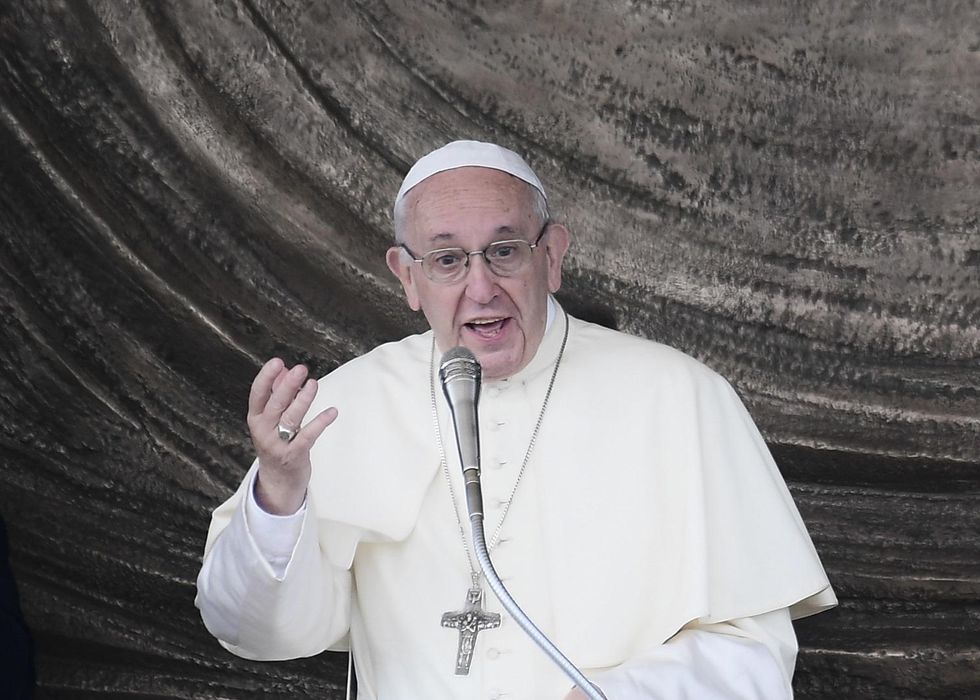
Pope Francis recently approved changes to the Catholic Church's catechism that forbids the death penalty in all circumstances. (Filippo Monteforte/AFP/Getty Images)

Pope Francis has approved changes to the Catechism that clarify that the Catholic Church views the death penalty as being “inadmissible” in all circumstances.
While it is still noteworthy, this is by no means a reversal of prior Catholic doctrine. The Catholic Church had already held that the death penalty was forbidden except in specific cases when public safety was a concern. The previous version of this part of the Catechism, which was written in 1997, stated that instances where the death penalty was permissible were “very rare, if not practically nonexistent.”
In October, Pope Francis requested that the wording of the Catechism of the Catholic Church be updated to reflect that in modern times even this exception was no longer necessary.
The Congregation for the Doctrine of the Faith came up with a revised version of the Catechism that stated that the death penalty was no longer permissible in any circumstances. On Wednesday, the Congregation sent a letter to Catholic bishops announcing that the Pope had approved the changes.
The new text states that today “more effective systems of detention have been developed, which ensure the due protection of citizens but, at the same time, do not definitively deprive the guilty of the possibility of redemption.”
In the letter announcing the change, the Congregation's leader, Cardinal Luis Ladaria Ferrer, said that this change did not contradict earlier church teachings, which “can be explained in the light of the primary responsibility of the public authority to protect the common good in a social context in which the penal sanctions were understood differently, and had developed in an environment in which it was more difficult to guarantee that the criminal could not repeat his crime.”
While there are instances where the Catholic Church considers the Pope's teaching on faith or morals to be infallible, this is an approval of changes made by the Congregation for the Doctrine of the faith, and is not considered an infallible act by the Pope.
The previous reading of the catechism read:
Assuming that the guilty party's identity and responsibility have been fully determined, the traditional teaching of the Church does not exclude recourse to the death penalty, if this is the only possible way of effectively defending human lives against the unjust aggressor.If, however, non-lethal means are sufficient to defend and protect people's safety from the aggressor, authority will limit itself to such means, as these are more in keeping with the concrete conditions of the common good and more in conformity to the dignity of the human person.
Today, in fact, as a consequence of the possibilities which the state has for effectively preventing crime, by rendering one who has committed an offense incapable of doing harm - without definitely taking away from him the possibility of redeeming himself - the cases in which the execution of the offender is an absolute necessity “are very rare, if not practically nonexistent.”
The new text says:
Recourse to the death penalty on the part of legitimate authority, following a fair trial, was long considered an appropriate response to the gravity of certain crimes and an acceptable, albeit extreme, means of safeguarding the common good.
Today, however, there is an increasing awareness that the dignity of the person is not lost even after the commission of very serious crimes. In addition, a new understanding has emerged of the significance of penal sanctions imposed by the state. Lastly, more effective systems of detention have been developed, which ensure the due protection of citizens but, at the same time, do not definitively deprive the guilty of the possibility of redemption.
Consequently, the Church teaches, in the light of the Gospel, that “the death penalty is inadmissible because it is an attack on the inviolability and dignity of the person”, and she works with determination for its abolition worldwide.